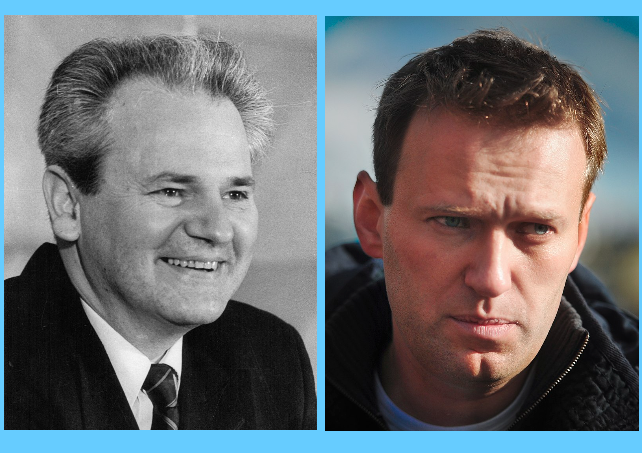It was a few days ago that Alexei Navalny died in a Russian prison. What a gift for the Western world, what a remarkable coincidence! With the fall of Avdiivka and the approaching presidential election in Russia, with the farmer protests that have shaken every other EU country, with the difficulties that the American president has getting yet another approval of by Congress for his financial aid for Ukraine, Alexei Navalny’s death is really a godsend. Of course all the media and commentators have shown themselves to be soothsayers: they all know for certain that Navalny was murdered. By Putin’s henchmen, no need to add. They all know it, the soothsayers that they are, no evidence is required. The consumers of the media, properly preconditioned for years, can only nod their heads in agreement.
In 2000, also in a prison, died Slobodan Milošević, Yugoslavia’s and then Serbia’s president. Nobody ever came up with the idea that he might have been murdered. God forbid! Slobodan Milošević was incarcerated in a democratic European Union, which honours human rights and is averse to deceit, violence, illegal methods of interrogation, injustice and the rest of it. Slobodan Milošević was justly brought to court because – unlike Navalny – he was the bad guy, who was responsible fully or partly as the case may be for no smaller a crime than genocide of Kosovars and Croats. Though Alexei Navalny according to his own words felt intense hatred towards non-Russians in Russia, which was familiar to anyone who only cared to listen to or read his statements, though because of that Alexei Navalny would have been termed as a white supremacist in the West, miraculously his controllers turned a blind eye to his political beliefs.
But then, do we wonder? Everything and anything is used – abused – misused – (choose the appropriate word) – to suit the managers of the world. Serbs needed to be bombed by NATO because they were reported to have murdered a number of Kosovars and Croats; Ukrainians, officially followers of the Stepan Bandera racist and chauvinist ideology need to be unconditionally supported by the collective West, which otherwise is oh so sensitive when other comes to nationalisms, racism, fascism and similar ideolo gies.
Alexei Navalny was a hugely inflated front man if ever there was one. Look up the English Wikipedia article about him and compare with that devoted to Vladimir Putin. Alexei Navalny, a man whose political popularity in Russia never exceeded 5% (five) enjoys a text of 78 PDF A4 pages, whereas Vladimir Putin, a recognized leader with huge popularity – 107. John Kennedy – one of the better known modern-age American presidents – has a mere 55 pages. Even John Paul II, the most popular and widely recognizable pope, is no match for Navalny: the Wiki article about him is 71 pages long.
Do you remember how Slobodan Milošević landed up in jail and how was Alexei Navalny imprisoned? The difference is striking and telling. Let us recall. Under the pressure from the collective West Slobodan Milošević, once he ceased performing the function of president of Serbia, was arrested by his own authorities, his own state and handed over to the Hague to stand trial there. How did Alexei Navalny end up in prison? Let us recall it. He happened to be in Russia where he was oh so unjustly prosecuted and persecuted, and one day he sank into a coma due to a poison administered to him by the notorious KGB (Russian equivalent of the American CIA), or at least that’s the official Western story. Navalny’s wife demanded that her husband be released to Germany for medical treatment and Vladimir Putin, the mad dictator that he is, let him leave Russia, knowing full well that his agents had bungled the operation of poisoning Navalny (obviously he was on the way of surviving) and knowing full well that German doctors – chemists – pharmacists – would find the traces of the substance that was to kill Navalny. Nevertheless the dissenter was released and cured of his poisoning in Germany, and of course German specialists found the traces of poison, didn’t they? Once cured, safe and sound, Alexei Navalny decided to return to Russia to be prosecuted and persecuted by the undemocratic regime. Why for heaven’s sake? To make things even more Hollywood-like, before returning to Russia, Navalny managed to produce a documentary which exposed Putin s a man who stashed away millions in order to build a palace for himself in the Crimea. Only after the film was made public and shown on YouTube did Alexei Navalny go back to Russia. What could he expect there? The really interesting question is: did Alexei Navalny really want to go back or was he made to? Did not the Russian authorities by letting him out of Russia show that they wanted to get rid of him rather than have him imprisoned? What was Navalny promised in return for agreeing to do time in prison? Who promised it?
You see, it was not so, as in Slobodan Milošević’s case, that the Russian government pressurized Germany to release Navalny. No. Navalny appears to have been a pawn in the hands of powerful players who traded his life for political benefits. He seemed to be useless in the West, but very useful inside Russia. A prisoner of conscience! Living evidence of the dictatorial and inhumane Kremlin authorities! That’s the message. That Navalny was sentenced for corruption and other acts of violating the law is not on the radar of the Western media. He was important as a card to be played and sacrificed if need be.
Slobodan Milošević was Serbia’s and formerly Yugoslavia’s patriot; Alexei Navalny was a traitor to Russia. Slobodan Milošević’s death was of course – how otherwise? – of natural causes; Alexei Navalny’s demise was of course – how otherwise? – murder in cold blood. End of story.





